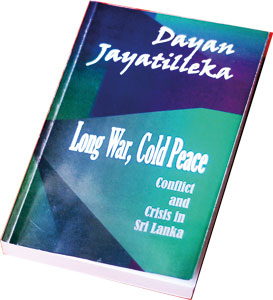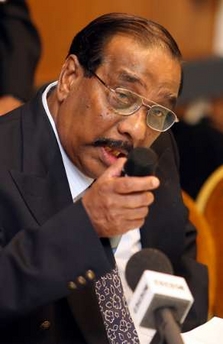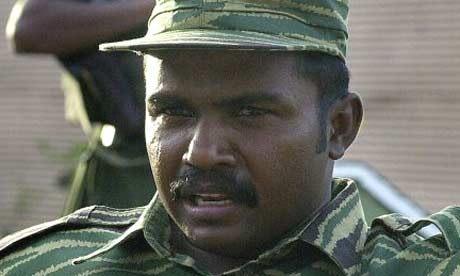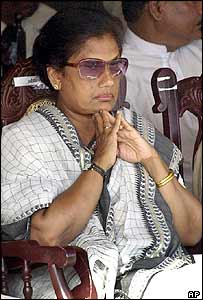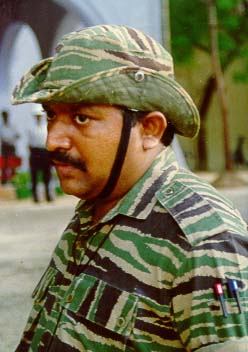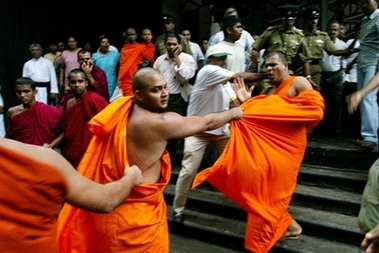By Colombo Telegraph – “No one particular, could be with the exception of Gothabaya Rajapaksa, but he’s the only particular person I can mention who considered a military victory was achievable. I was quite hard to say extremely close to Indian intelligence and an tremendous sum of time all through this process and never, ever did any Indian official hint that a military victory was achievable until mid 2008.
Then they started, I observed the change in Mr.M.K.Narayanan and others and gradually shift into the position that may be, state may be the government can wipe out the tigers military victory.”Norwegian peace envoy Erik Solheim said last week
“Sri Lankans try to manipulate every single day for whole this 10 years, for their business interest part of that they tried to manipulate all. We may be fool but no so foolish that we understand that they tried to manipulate.” Minster of the Environment and international Development Erik Solheim further said.

Sri Lankans try to manipulate every single day for whole this 10 years, for their business interest part of that they tried to manipulate all. We may be fool but no so foolish that we understand that they tried to manipulate.
Eric Solheim made this remarks last week in Oslo seminar followed by the launch of the evaluation report of the Norwegian Peace effort in Sri Lanka. Theevaluation has been performed by CMI in Bergen and the School of Oriental and African Studies (SOAS) in London, and deals with the Norwegian peace effort in Sri Lanka between 1997 and 2009.
Following is the full text of the speech made by Erik Solheim
Let me start by thanking Mr.Gunnar and his team for a very valuable and interesting report. I’ve not been able to study everything at this stage, we will go through it, all the big and small parts…the big and small issues which are covered by the report and see to what extent I can inform and to see what I can do to assist Sri Lanka in the future and more importantly how this can help Norwegian efforts in other peace processes.
Norway is involved in one way or other in may be 20 peace processes in world and very few of them, at the moment, not as a main actor as in Sri Lanka, but in supporting the parties and supporting other international actors in bringing peace so it’s very valuable to look into all these experiences which are experience, this may be the first time, certainly, it isn’t normal, that one involved in the peace process is commissioning a report in to all the positive and negatives of what happened.
Norway should have withdrawn from the peace process
I broadly agree with most comments made and had one major reservation and let me start with that. I think indeed that Norway should have withdrawn from the peace process when it was clear to everyone that the government of Sri Lanka wanted a final military victory.
Every one knew that, was no doubt in Washington, or Beijing, or Colombo or Vanni about that. No one was in doubt of that. Indeed at this point we should have withdrawn. I think it is extreme arrogant why, because the Tamil Tigers asked us to continue, the government of Sri Lanka at least, in some extent, asked us to continue. A complete civil society and all the peace groups in Sri Lanka asked us to continue. The United States of America asked us to continue. India asked us to continue. The European Union asked us to continue. Neither I nor Vidar Helgesen, should sit in Oslo and make the decision that when everyone else in the world asked Norway to do best under the most difficult circumstances, even when its war, even so many people are killed, we should try to withdraw.

. If Pirapaharan had not forced Tamil voters to abstain from elections in 2005 everyone knows that Ranil Wickramasinghe would have been elected the president, not Mahinda Rajapaksa, Everyone knows that. That would at least have been a major change in everything what happened after that.
I cannot disagree, more. I think it’s very arrogant because it’s putting Norway far above everything else. It’s about our reputation, not about what we’re asked to do. All those who are suffering from this war. Except for that major reservation, I agree a lot about what has been presented by Gunar hear.
If there is another, not major reservation, it is the following. We should be very cautious with determinism believing that the outcome of Sri Lankan events had to be what it actually was. Richard Armitage is at the first floor hear, I think he and myself agreed that the American Independence war by George Washington would have taken a completely different turn if George Washington had be hanged as a terrorist and the UK would have gone over at least 50 more years.
It was so close to a southern separation during the civil war in America in the 1860’s and was not far away. Very close. You can just make a few changes in a few of the battles or moving the election of 1860 away from the fall to the spring and the outcome would have been completely different.
If Pirapaharan had not forced Tamil voters to abstain from elections in 2005
This occurs in most important events in Earth’s history and the tendency by researchers by what actually is the end, had to be the end, I take a reservation with. Let’s mention a few of the “ifs” in the peace process of Sri Lanka. If Mr.Pirapaharan had not forced Tamil voters to abstain from elections in 2005 everyone knows that Ranil Wikremesinghe would have been elected as the president, not Mahinda Rajapaksa, Everyone knows that. That would at least have been a major change in everything what happened after that.
If Balasinham had not died of cancer, it may or may not have made a major difference; I think it would have made a major difference because after Balsinham’s death, the LTTE leadership made all the mistakes.
If Mr. Balasinham had not died of cancer, it may or may not have made a major difference; I think it would have made a major difference because after Mr. Balasinham’s death, the LTTE leadership made all the mistakes.
Prior to that they were quite clever both in the political and military field in the 3 years after Blasingam’s death, it was not one single meaningful political or military initiative from the Tamil Tigers.
Not one and there is no other way of explaining that influence of Balasingham’s disappear and Pirapaharan was alone to make decisions. So to say. If Karuna was not split, it was not, I think, in the invertible, it was basic from personal characteristics, not very nice, but it was what happened and it made an enormous change .
 If Chandrika Kumaratunga or the other actors had to be able to move one or two months after the Tsunami, it was a completely new set up in Sri Lanka.
If Chandrika Kumaratunga or the other actors had to be able to move one or two months after the Tsunami, it was a completely new set up in Sri Lanka.
Tamil Tigers assisted the army. The army assisted Tamils. Was really a new beginning but it was drawn out, drawn out, the momentum was lost and basically nothing happened.
If we had been able to achieve a major change or development here I think everything would have been very different. Not necessarily, exactly what we had hoped for but it would have been very different. And I can continue with a number of other such if, So I think we have to judge historical events on the basis of the available information at that time, not when we know what happened. But that’s hard when we don’t know exactly what happened because what happened was not necessarily what had to happen. Then, let me add one or two other aspects. No one believed there was a military victory possible.
Gothabaya Rajapaksa the only exception
No one. May be with the exception of Gothabaya Rajapaksa but he’s the only person I can mention who thought a military victory was possible.
No one in Colombo thought it was possible, I was very hard to say very close to Indian intelligence and an enormous amount of time throughout this process and never, ever did any Indian official hint that a military victory was possible until mid 2008. Then they started, I observed the change in Mr.M.K.Narayanan and others and gradually shift into the position that may be, still may be the government can wipe out the tigers military victory.

If Karuna was not split, it was not, I think, in the invertible, it was basic from personal characteristics, not very nice, but it was what happened and it made an enormous change .
Before that no one thought it was possible, the United States thought it was impossible, USA, India and Colombo thought it was impossible so again complete change from what we all based the peace process on until that point.
Then coming to what can be learned. Because there are a number of these issues which are reflected in the report and also by Gunnar. Obviously have to be patient, that’s very obvious part of the peace process starting with the belief that this can be resolved in a few months time.
The Indians told us, please be patient, if you cannot be patient go away, get out of the way you will only complicate matters. This will take a decade at the minimum. So we learned to be patient and you need patience in any peace process.
Then you need to get the international context right, as was covered by Mr.Gunnar may be at the end the government won a military victory because it much better understood the international situation and tiger leadership. Mr.Rajapaksa understood it was basically possible to build up a coalition of China, Pakistan, Iran, and a number of new actors in the Sri Lankan context to get on one hand, military support from these new actors but on the other hand also using these new actors to put pressure on old actors in the sense that it would be very much more relaxing to see China coming in a more major way in Sri Lanka.
That was very clever international diplomacy by Rajapaksa out fuling that way the Tigers in … that way… so in the international context it’s very essential. Other issues the inclusiveness. Have to say that we were fighting throughout to particularly include the Muslim community in Sri Lanka in a much broader way in the peace process and to every one else that was not easy mainly because the Tamil Tigers were very reluctant to see a separate Muslim dimension to the struggle, but very very important in all peace processes to be as inclusive as possible.
The three main issues in my perspective in the peace process
Then I would come to the three main issues in my perspective in the peace process which we have to contemplate for future situations. Number one, the peace priority list is weather are there other ways to influence the Tamil Tigers leadership in a more effective way than we did. You may please recall Norway was the only access to Pirapakran. background, I met Pirapakaran may be ten times and absolutely no tiger in

If Chandrika Kumaranathuga or the other actors had to be able to move one or two months after the Tsunami, it was a completely new setup in Sri Lanka.
that background, none. During the peace process, except for Norwegians, Mr.Krish Paten from EU meet him onece, and Akashai from Japan, may be once, or twice, except for that it was just Norwegians. Mr.Lars combined thirty hours with during this peace process. He spoke only Tamil and my Tamil is limited so it was a relatively limited time. I think it was completely wrong …. That other actors did not want to speak to him unless he behaved well. The more people that need to speak to Pirapakaran the better.
The government would have been reluctant to that because that would have been a recognition of his role that I think the more the LTTE would have been opened up, the moel actors that would have been able to meet in a international community mole the more likely a success would have been.
That’s right what Gunnar said, when Balasingham negotiated to do so call Oslo declaration which they said LTTE will explore Federalism where Milinda and myself who wrote that document here in Oslo Balasingham accepted it and took it to Pirapakaran, he refused it. It was not public at that time but it is very clear he refused it. Because he was realizing to federalism. But still have been ……. or influence in LTTE Leadership. In reality that Mr.Pirapakaran, more that is the most, that is the number one crucial issue. Blasingham told me that please understand Mr.Pirapakaran is a war lord. he is not in a democratic society not understanding international community not understanding the base in Europe and USA.
Blasingham told me that please understand Mr.Pirapakaran is a war lord
He is ……. in a war load. May be studying the war lords, chins history in the early part of the …. the best parallel to study Pirapakaran, Balasingham hinted. Its not my idea. if that the case more have been done to open up their ice, their understanding of the world and should be have done that more on that matter I thing that was completely wrong that USA, Europe and anyone else ask me please you behave well very long period of time we will talk to you. So we should have talked to them all the time as much as possible 24 hours if possible. This is the number one status issues.
It may, People may thing that up on this from world assistant, stutterers, tactical experience, it may seen as very personal oriented but the reality was Pirapakaran was the LTTE, without Pirapakaran LTTE will have existed and all major decisions whatever type will be made by Pirapakaran. No one else. he will of course speak with some of the military leaders definitely consulting with Balasingham but ultimately he will make decisions and it was very hard, I never heard any Tamils giving and wanted advice to Mr.Pirapakaran I thing that would be very difficult to any Tamils to knock at door to going to Pirapakaran and say that you are on a wrong path you shouldn’t do this and that.Only person should do that Balasingham. Because he was 10 years senior.
Second issue very much covered by Gunnar. There are two parties in Colombo. UNP and SLFP they had a long long history of not working together. During most of the peace process Chandraka was the President Ranil Wikremesinghe was the Prime Minister and they were not speaking … and they were both believing that they are whatever they do possible to do in their my or in their situations.

. Blasingham told that please understand Pirapakaran is a war lord. he is not in a democratic society not understanding international community not understanding the base in Europe and USA.
Should have been done more on that regards. We felt that it was outside Norway mandate. We felt other mandate was to negotiate that those in power in Colombo where ever they are and the Tamil tigers and that intervening on that would be intervening mean that domestic affairs in State of Sri Lanka.
Mr.Fox that UK’s Minister of Defence, he just left his post, made so called FOX agreement in late 1990s you should cover that. There was lots of efforts that Indian and others to bring by two parties together but should have been Norway should have forced to …. may be we should have done that more to ask both parties to do like India and UN to do it, would have been very very difficult. Very critical issue I do not know what extend discuss it the peace agreement was in the beginning before the cease fire agreement should more effort have been done bring Chandrika into that. Because that was done right after Ranil Wikremesighe made political victory he was on the political assurance, very strong and very popular at that point. Chandrika was as you said sidelined.
Should more have been done to bring Chandrika in to that agreement
That’s true, should more have been done to bring her in to that agreement at the beginning, mover mental that has been lost but it is a critical issue of course if there has been a two party agreement in Colombo with their LTTE that would have made enormous different that’s very clear. But I think that was outside to Norway to archive it. May be we should have been done more to try to convince others to act will be lots, possibly has been done more. The last issue like to bring that also coved the issue of communication. Its true that Norway became very unpopular at least that peace process has lasted long partially in …… Nationalists Sinhala groups, that’s very clear. I thing that main reason for that with optics whenever someone saw Mr.Pirapakaran or LTTE …. to Norwegians because no one else going there, so other, I will be there or Ambassador or Johan or someone else, I mean if Pirapakaran or Balasingham or Tamilselvan, whether it was on TV normally the Norwegian with his side, it gave important to Sri Lankans that Norway was very close to LTTE. Since no one else LTTE did this. This was optical reason was why this became an issue.. but still we should have discussed, may be better media strategy. However of course, that party not wanted Norway to have a high profile. they wanted to be a process between that LTTE and the government they wanted us to make comments particularly when they have agreed some things but did not want Norway to be seen as speaking behalf of its self… defending its own role on this on media and that.. that clearly told that was what the parties want to see and still I mean is an issue, definitely need more consideration whether it should have play that or done more on this. Other issue in commutation is their one group. I am very clear we should have done more to reach out to the Buddhist clergy in Colombo in Sri Lanka and Mahanayaka in Kandy and others, the very important spiritual leaders in Sri Lanka. We were clearly adviced by Chandrika Kumaratunga not to spend too much time on the Buddhist clergy. So this not our idea, she was telling not to do it,. We wanted to do, but told not to do.. …… itself and don’t interview in this … leave that to us. At least to that inside today we should have done more to reach out to the Buddhist clergy because of their loyalist on the Sinhala side was so so important. so these are some of the issues for discussion. There are many big and small at the end two big one that finding of the issues of the peace process was should more have been done to reach out to Pirapakaran to get him at end to accept a federal states. that other was should more have been done bring together UNP and SLFP, Ranil and Chandrika, if we have been able to do very different or one or other this too, that would have been a completely different process these are the two essential questions.
If you want to receive support from USA will you kill any USA president?
I don’t think that war on terror was a main problem here, On one hand LTTE made enormous mistakes, the reason why the war on terror became so important in Sri Lanka was that LTTE made high profile assassinations against Sri Lankan politicians, it gave them nothing on any political or military point of view. Why in hell killing Rajiv Gandhi. Animus blander, if you want to receive support from USA, will you kill any US president? India was the main source of support to Tamil Tigers, why then killed? Rajiv Gandhi was a outstanding Indian Prime Minister.This was animus mistake, Whenever Pirapakaran told us stop killing, he keep (strikes) his words, that’s more than I can say that Sri Lankan Sinhala politician,

I am very clear we should have done more to reach out to the Buddhist clergy in Colombo and Mahanayaka in Kandy and others. The very important spiritual leaders in Sri Lanka, we were clearly adviced by Chandrika Kumarathunga not to spend too much time on the Buddhist clergy
Pirapakan always did. One example right after Mahinda elected president, LTTE started huge number of killing against Sri Lankan army soldiers then we went to Pirapakaran he promised to stop it. He stopped it. There was no killing by LTTE then the Government started killing different Tamils. Then too LTTE responded. Government that point insisting the killing. LTTE did not start the peace process at the weak point. They started the peace process at the peak of power. LTTE was ever powerful at 2000 and 2001.
LTTE did not start the peace process at the weak point
LTTE was too close to capture Jaffna peninsula, LTTE distorted Bandaranayaka airport in Colombo, bringing the economics of Sri Lankan state to zero. There was a peak of the power they started peace process, We Norway had good relation with Government in Washington and Norway embassy in Oslo. Their is not one critical remarks what so ever on WikiLeaks on Norwegian role on peace process. There USA cannot do it, will not do it, its very common Norway doing it. We have been …… bringing ….. killing by Sri Lankan state, I will give you ample of examples, MP. Pararajasingham good friend of mine was killed in Xmas day in a Christian church, Obviously this was by Sri Lankan state.One of the main famous Editor in Colombo Lasantha Wickaramatunga, another friend of us through peace process known very well killed by state of Sri Lanka.
Absolutely there is no doubt about that, that should be condemned and who was responsible for this crime should be brought to courts.
It was absolutely right to regret the ban of LTTE the point of views of Norway, how could you play as a mediator if band one organization you should talk to that group is impossible, I thing that banning the LTTE is not a good idea, because I … to that …..that much …. that overwhelmed by LTTE to political come forward bringing them out in the light discussing with them and trying to convince top leadership that has to informs them self.That is the reason why took prevalence that in Europe very clear on so many occasion we not able to stop this kind of terrorist killing that provoke the EU.
Sri Lankans try to manipulate every single day for whole this 10 years
Sri Lankans try to manipulate every single day for whole this 10 years, for their business interest, part of that they tried to manipulate all. We may be fool but no so foolish that we understand that they tried to manipulate.
I still believe that this peace process should have taken a different cost… so I don’t think too high expectation may be from the beginning much more easy, but it was not right to do it, Expectations has gone very differently I thing it was right.
India though out had VETO power over the peace process, Milinda and myself went to Delhil many time but I don’t know how many times has been at the airport and New Delhi meetings whith Indian Intelligence and others, there was no major steps on the peace process what so ever taken without informing India same times they tacis excess may have disagreed India was throughout Informed.
That was very simple, they want that view, India for most important friend in Sri Lanka. USA is important also, for USA India and Sri Lanka is a co-Interest.
USA never ever realize their relationship with India, for example for Sri Lanka. If India on board, ultimately USA basically flow. Even what nation’s …… to SLMM they give a list of the national they will aspect we will respect from that.
Watch full video;
http://www.youtube.com/watch?feature=player_embedded&v=MtYY9QNrrIU


